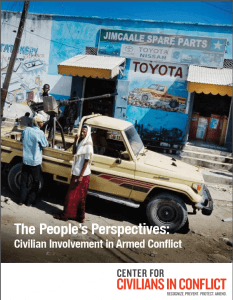This report from the Center for Civilians in Conflict explores the perspectives and experiences of civilians in conflict-affected countries. The report consists of an analytical overview and four case studies in Bosnia, Libya, Gaza, and Somalia.
The findings of the report underscore the importance of considering the perspectives of the affected population, whether or not they consider themselves to be combatants, and particularly their motivations for involvement in conflict. The report found that civilians are involved in conflict in numerous and complex ways, from taking up weapons and joining the fight, to providing armed groups with logistical support such as driving or supplying food, or joining institutions, political parties, or other organizations. These civilians may or may not realize when they are considered to have taken a direct part in hostilities and thus forfeited their legal immunity from direct attack. Motivations for involvement in conflict by civilians are myriad with the most common motivation described in all for case studies as the protection of self and family.
These considerations, the ways in which civilians are involved in conflict and their motivations to do so, are essential to inform a robust and comprehensive protection analysis.
